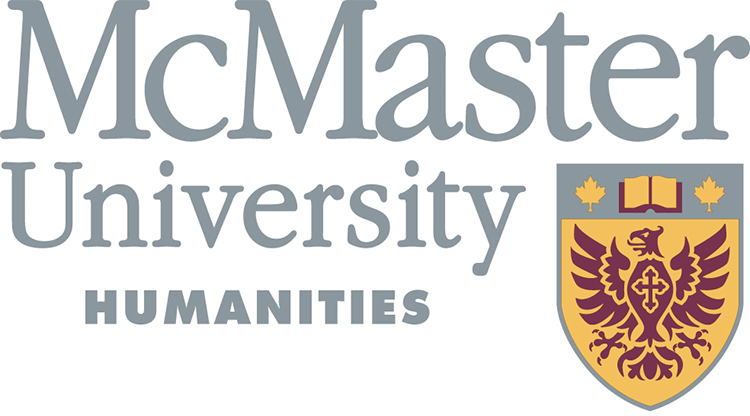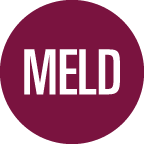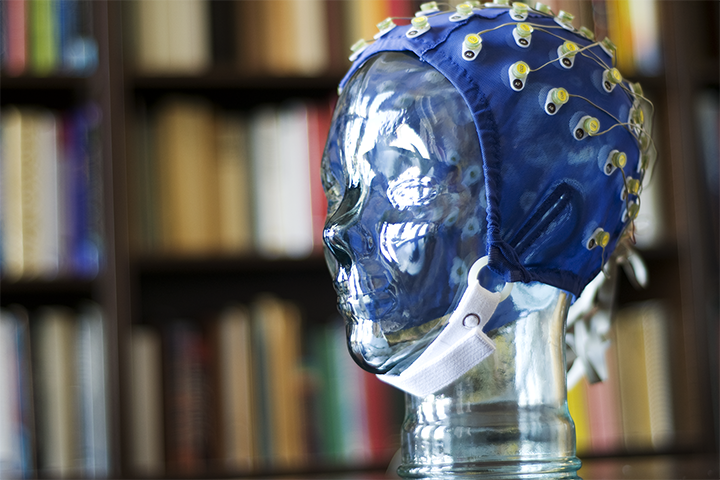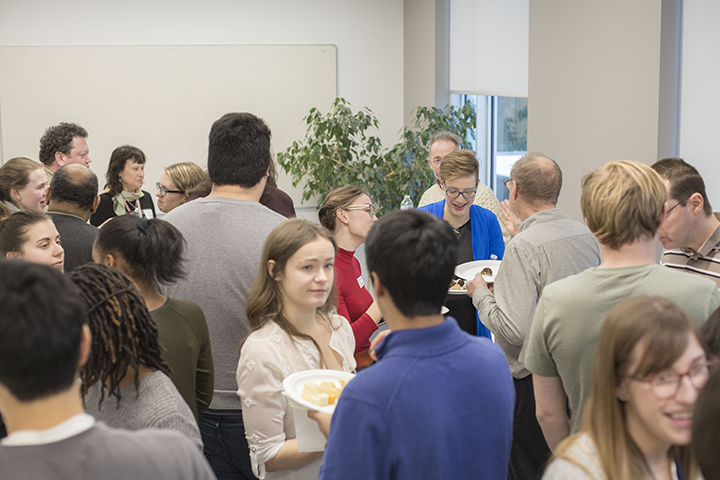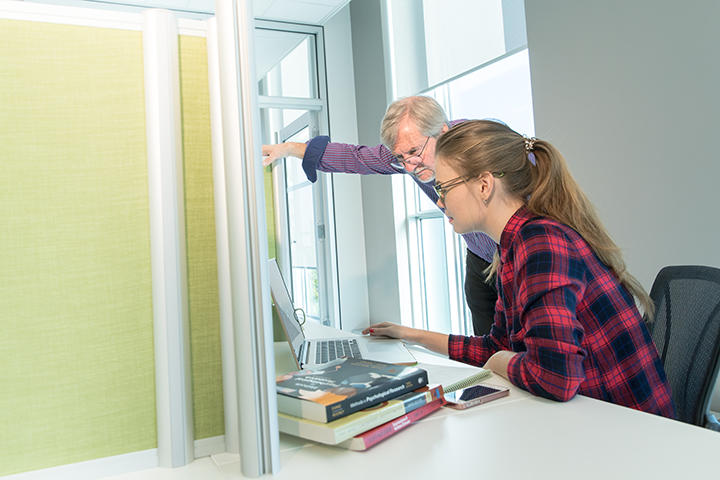ARiEAL
Annual Report 2017
Centre for Advanced Research in Experimental and Applied Linguistics
Message from the Director

Also, 2017 saw us move into our permanent location at the new L.R. Wilson Hall (LRW) on McMaster University campus. In this inaugural annual report, you will not only see the achievements of individual members but also the emerging pattern of collaboration among our researchers and their own national and international networks.
The Centre’s membership currently includes faculty members from McMaster University and Western University with representation from faculties of Engineering, Health Sciences, Humanities, Social Sciences, and Science. This breadth of membership reflects the interdisciplinarity of the members’ research – one of the primary characteristics of the Centre and its objective in providing a supportive environment for research that crosses traditional boundaries.
Also, ARiEAL views knowledge translation as a critically important part of its mission. Our efforts here are evident in the workshops presented by our invited speakers and lecture series that we have co-hosted with the Department of Linguistics and Languages (see IMPACT Section of this annual report). This 2017 annual report marks our first milestone and we look forward to sharing many more with you in the coming years.
Sincerely,
Dr. John Connolly
Director, ARiEAL Research Centre
Professor, Department of Linguistics and Languages
Senator William McMaster Chair in the Cognitive Neuroscience of Language
Message from the Director

Hello and welcome to the Centre for Advanced Research in Experimental and Applied Linguistics (ARiEAL). 2017 was a remarkable year for ARiEAL. It marked the first full calendar year since our inception in late 2016.
Also, 2017 saw us move into our permanent location at the new L.R. Wilson Hall (LRW) on McMaster University campus. In this inaugural annual report, you will not only see the achievements of individual members but also the emerging pattern of collaboration among our researchers and their own national and international networks.
The Centre’s membership currently includes faculty members from McMaster University and Western University with representation from faculties of Engineering, Health Sciences, Humanities, Social Sciences, and Science. This breadth of membership reflects the interdisciplinarity of the members’ research – one of the primary characteristics of the Centre and its objective in providing a supportive environment for research that crosses traditional boundaries.
Also, ARiEAL views knowledge translation as a critically important part of its mission. Our efforts here are evident in the workshops presented by our invited speakers and lecture series that we have co-hosted with the Department of Linguistics and Languages (see IMPACT Section of this annual report). This 2017 annual report marks our first milestone and we look forward to sharing many more with you in the coming years.
Sincerely,
Dr. John Connolly
Director, ARiEAL Research Centre
Professor, Department of Linguistics and Languages
Senator William McMaster Chair in the Cognitive Neuroscience of Language
Research Highlights
ARiEAL brings together a diverse yet cohesive collection of researchers with expertise in linguistics and languages, relevant clinical conditions, and key neurophysiological, neuroimaging, and behavioural measures in order to advance understanding of the neural, behavioural and social foundations of human communication. Highlighted below are the 2017 research activities from each laboratory led by ARiEAL researchers.
- Language, Memory and Brain Lab
- MELD Program & Bilingualism Lab
- Teaching & Learning Lab
- Language, Reading and Cognitive Neuroscience Lab
- The Syntax Lab
- The Reading Lab
- Imaging Research Centre
- The Phonetics Lab
- The Reilly Lab
- The Turkstra Lab
- The Language and Working Memory Lab
- The mTBI Research Program
- The Performance Science Lab
Language, Memory and Brain Lab
The Language, Memory and Brain (LMB) Lab, co-directed by Drs. John Connolly & Elisabet Service, conducts research using brain recording/imaging and behavioural measures to investigate a range of topics including basic research on language learning, spoken word processing, and working memory and related cognitive processes. Much of this work is then applied in investigations of problem reading including dyslexia as well as studies of brain injury and disorders of consciousness. Dr. Connolly focuses primarily on the neuroscience of cognition with applications to assessment of clinical populations, while Dr. Service’s research focuses on cognitive aspects of processing, acquisition and impairments of language. In 2017, two students, Michael Greencorn and Fareeha Rana, from the LMB Lab successfully completed their master’s degrees, and Anni Nora (co-supervised by Dr. Riitta Salmelin of Aalto University, Finland, and Dr. E. Service) as well as Narges Armanfard (supervised by Dr. James Reilly in collaboration with Dr. J. Connolly) completed their doctoral degrees. The LMB Lab’s collaboration with Dr. Noseworthy’s Imaging Research Centre and the Hamilton Spectator on concussion research with retired CFL players received media attention in 2017 with its findings of long-term brain changes linked to concussion. A four-part series on this study was then featured in Hamilton Spectator and the Toronto Star in September. This soon went viral and led to a range of interviews and coverage in a variety of news outlets. The coma project continues successfully and a Collaborative Health Research Projects (CHRP) grant application was made to support expansion of this work (funded in 2018). 2017 also saw the conclusion of a CIHR-funded project on child and youth concussion involving Drs. Connolly and Noseworthy and Prof. DeMatteo. Publications on the concussion research and disorders of consciousness that also involved other ARiEAL members appeared in PLoS ONE and Consciousness and Cognition in 2017 with other related papers accepted in IEEE Journal of Biomedical and Health Informatics, and Clinical Neurophysiology. Moreover, Dr. Service received an interdisciplinary ARB grant with collaborator Dr. Catherine Connelly of the DeGroote School of Business, to study the effects of second language use on performance of work-like tasks. Dr. Service also continues as collaborator on a grant from the Academy of Finland (2016–2019) to study developmental language disorder in monolingual and bilingual children.
MELD Program & The MELD Bilingualism Lab
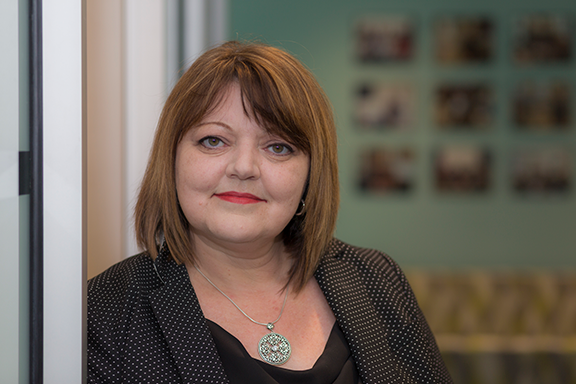
Associate Director of the ARiEAL Research Centre and Director of MELD programs and the Bilingualism Lab, Dr. Anna Moro
The McMaster English Language Development Diploma (MELD) program and the Bilingualism Lab are both directed by Dr. Anna Moro. MELD is intended for international students whose primary language is not English, but who wish to improve their English proficiency to succeed in an English-speaking higher education environment. The Bilingualism Lab investigates the underlying linguistic mechanisms of bilingual phenomena and focuses on second language acquisition. While MELD is not a research laboratory per se, interesting research on foreign language acquisition is being conducted on a regular basis with the support and guidance of the Bilingualism Lab. During September-October 2017, the MELD program began its testing schedule for the 2017-2018 cohort of students. At this time point 90 MELD students took part in an eye-tracking experiment in which participants silently read passages of varying complexity for comprehension as eye-movements were recorded. In addition, the MELD research team administered a battery of tests in which key component skills of reading (phonological processing, expressive and receptive vocabulary knowledge, reading comprehension) were measured. This testing procedure was administered to the same participants in March-April 2018 with the aim of tracking improvements of reading in English.
Teaching and Learning Lab
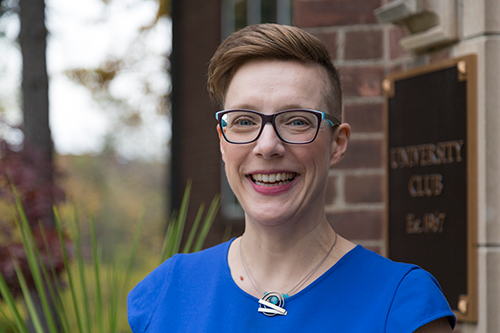
Director of the Teaching & Learning Lab, Dr. Catherine Anderson.
Dr. Catherine Anderson, a Teaching Professor in the Department of Linguistics and Languages, directs the Teaching & Learning Lab. The lab’s research, all of which is conducted in collaboration with undergraduate student partners, focuses on students’ experiences in a variety of undergraduate learning contexts. In 2017, student partners conducted research on Team-Based Learning and the Active Learning Classroom; students’ use of Open Educational Resources; and on accessibility in blended learning environments. The lab also participated in data-gathering and analysis for the cyclical review of the undergraduate programs in the department.
Language, Reading and Cognitive Neuroscience Lab
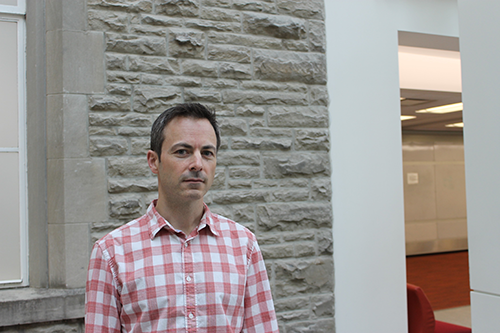
Director of the Language, Reading and Cognitive Neuroscience Lab, Dr. Marc Joanisse.
The Language, Reading and Cognitive Neuroscience Lab is directed by Dr. Marc Joanisse, and is housed at The University of Western Ontario’s Brain and Mind Institute. Dr. Joanisse’s Lab examines the cognitive and neural foundations of language and reading across the lifespan. This includes studying reading and language disorders in children, as well as language learning and processing in adults. A wide variety of experimental techniques including eye-tracking and event-related potentials measured with EEG are used, along with resting-state and task-based functional magnetic resonance imaging. In 2017, the lab focused on studying second language processing, with an emphasis on using neuroimaging to identify how age of acquiring a second language influences the neural markers of multilingualism. The lab is also undertaking a multi-year project in which they are examining the influence of reading remediation on brain markers of reading impairment in school-age children.
The Syntax Lab
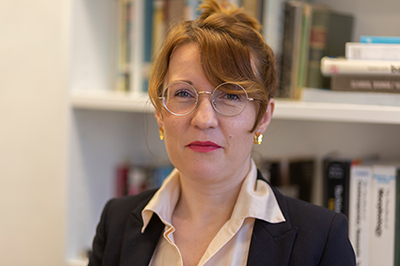
Director of the Syntax Lab, Dr. Ivona Kučerová.
The Syntax Lab is directed by Dr. Ivona Kučerová and it investigates syntactic structures, i.e., combinatorial properties, of natural languages from the general-cognition perspective. Both traditional fieldwork and experimental methods are used to collect data from cross-linguistically diverse languages, including indigenous languages of Canada, in order to identify and model universal and language-specific structural properties human languages have. The primary focus of the work currently done in the lab is on grammatical expressions of animacy. In 2017, the Syntax Lab was engaged in fieldwork on Mohawk (with Dr. Ryan DeCaire, University of Toronto and Dr. Alana Johns, University of Toronto) and Inuktitut (with Dr. Alana Johns). In addition, the research assistants collected a series of animacy data from a number of typologically unrelated languages (Tagalog, Libyan Arabic, Portuguese etc.). The data has been analyzed and has become a part of a database (to be made publicly available). The lab has participated in several experimental projects on sentential processing (with Dr. Diogo Almeida, NYU Abu Dhabi; Dr. Jon Sprouse, University of Connecticut; and Dr. Jan Chromy, Charles University). Finally, the lab has started a groundwork on creating a formal research collaboration with the communities of the Six Nations of the Grand River.
The Reading Lab
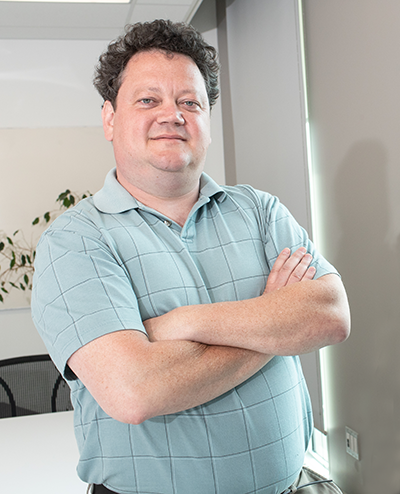
Director of the Reading Lab, Dr. Victor Kuperman.
The Reading Lab is directed by Dr. Victor Kuperman and it targets a range of areas in psycholinguistics and corpus linguistics. More specifically, the Reading Lab focuses on the visuo-oculomotor and cognitive predictors of reading, processing of printed morphologically complex words, and effects of emotion on language production and comprehension. Eye-tracking is the key research paradigm at the Reading Lab. In 2017, the Reading Lab welcomed one new Master’s student (Davide Gentile), two new PhD students (Kelly Nisbet and Melda Coskun), and one new post-doctoral researcher (Dr. Aki Kyröläinen). Members of the Reading Lab had a productive 2017 presenting their work at various international conferences, including the European Conference for Eye Movements in Germany and the 10th Morphological Processing conference in Italy. Through Dr. Kuperman’s collaboration with “Words in the World (WoW)”, a SSHRC Partnered Research Training Initiative, the Reading Lab hosted many researchers from around the world to conduct workshops and/or present at the lecture series at ARiEAL.
Imaging Research Centre
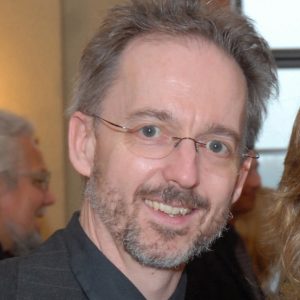
Director of the Imaging Research Centre, Dr. Michael Noseworthy.
Dr. Michael Noseworthy is the director of the Imaging Research Centre at St. Joseph’s Healthcare Hamilton, which provides the research community with access to the cutting-edge imaging technology (including the GE Healthcare 3T Discovery MR7503T MRI scanner, and the Siemens Biograph-16 PET/CT scanner). In 2017 Dr. Noseworthy’s team developed novel imaging technology to assess various forms of diffuse brain injury. For example, concussion, chemobrain chemotherapy-induced brain damage and inflammatory-induced chronic fatigue syndrome. In addition, his team has built MRI hardware and written new pulse sequences for rapidly assessing the high energy phosphates (ATP, PCr, etc.) and intra/extracellular sodium levels within the brain. His team continues to develop novel technology for non-proton based MRI scanning.
The Phonetics Lab
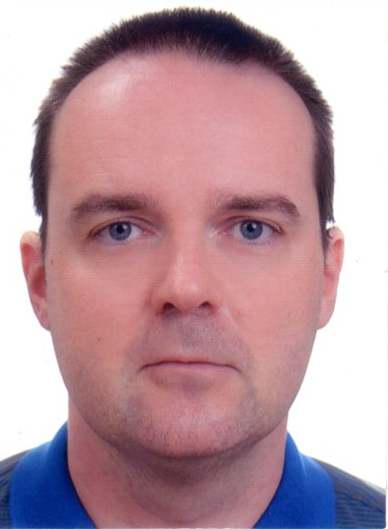
Director of the Phonetics Lab, Dr. Daniel Pape.
The Phonetics Lab is directed by Dr. Daniel Pape, and it focuses on experimental phonetics, the link between speech production and speech perception, and the relationship between phonetics and neurolinguistics. More specifically the research at the Phonetics Lab examines the use and interplay of acoustic cues (i.e., cue-weighting) for (1) speech production and perception and (2) articulatory and biomechanical constraints in speech perception. In 2017 the study on perception of acoustic vs articuatory cue -weighting for Canadian English sibilant fricatives continued. The work on the acoustic properties of Polish retroflex fricatives was completed and a new study on the articulatory settings and their relationship to the produced speech sounds for Polish retroflexes was started. Also a new study on the cue-weighting of Canadian English stops was started.
The Reilly Lab
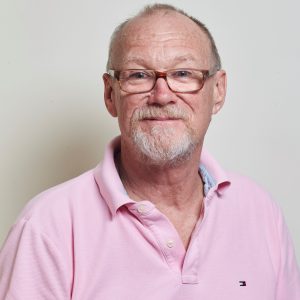
Director of the Reilly Lab, Dr. Jim Reilly.
Dr. Reilly works at the interface of machine learning and signal processing applied to health related problems, particularly in neuroscience and psychiatry. Specific projects in this area are the development of improved machine learning algorithms, diagnosis and treatment of psychiatric illness, prognosis for coma outcome, and the assessment of infant motor movement relating to neurological deficit. In 2017, two of the students (Narges Armanfard and Phil Chrapka) from the Reilly Lab successfully completed their PhD. Together with Dr. Armanfard and other colleagues, Dr. Reilly also filed for the provisional patent for “Expert System for Automatic, Continuous Coma Patient Assessment and Outcome Prediction”. While continually being supported by an NSERC Discovery Grant in 2017, the Reilly Lab (with Dr Vickie Galea, PI) was also awarded a grant from the McMaster Interdisciplinary Fund.
The Turkstra Lab
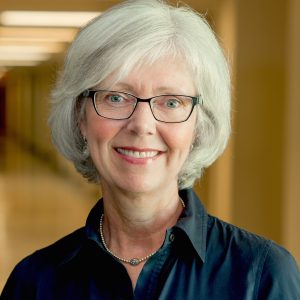
Director of the Turkstra Lab, Dr. Lyn Turkstra.
Dr. Turkstra’s research focuses on links between cognitive function and social communication in individuals with acquired brain injury. She conducts both experimental and translational research on communication in adolescents and adults, and collaborates on development of practice standards to translate research findings into improved clinical practice. In 2017, undergraduate lab members Jonathan Jin, Noel Kim, and Emily MacIntyre analyzed transcripts of more than 50 typical adolescents in everyday conversations, with assistance from Kathleen Oliver, Graduate Student at the Department of Psychology, Neuroscience & Behaviour. They presented their results at the Hamilton Health Sciences Acquired Brain Injury conference and received a poster award.
The Language and Working Memory Lab
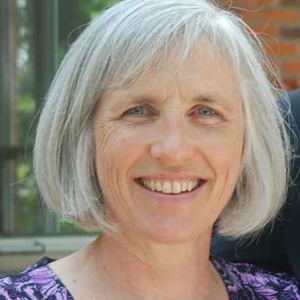
Director of the Language and Working Memory Lab, Dr. Lisa Archibald.
The Language and Working Memory Lab is directed by Dr. Lisa Archibald, and is part of the School of Communication Sciences and Disorders at The University of Western Ontario. The Language and Working Memory Lab focuses on investigating how language and memory processes interact in both children learning at a typical rate and those with learning disabilities. In 2017, work continued on the ongoing study examining early indicators of learning in kindergarten to grade 3 children. As well, the Language and Working Memory Lab began partnerships with educational speech-language pathologists in two school boards in Ontario to address questions related to their services for children with communication disorders. In related studies, the Language and Working Memory Lab completed investigations of adult word learning in a variety of contexts.
The mTBI Research Program
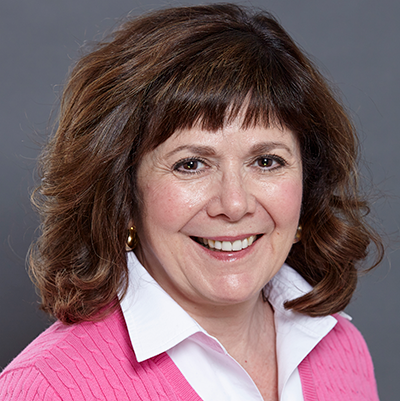
Director of The mTBI Research Program, Professor Carol DeMatteo.
As a clinician scientist, Professor Carol DeMatteo has led many research studies in the area of childhood neurotrauma, specifically all severities of acquired brain injury including concussion. Professor DeMatteo is based at CanChild Centre for Childhood Disability Research, and in 2017, her team was wrapping up a prospective cohort study evaluating the effectiveness of Return to Activity and Return to School Guidelines for children and youth with concussion. Professor DeMatteo presented a number of the preliminary results of this study, both nationally and internationally, specifically measuring compliance with Return to Activity and Return to School guidelines at The 12th World Congress on Brain Injury, and The First International Conference on Pediatric Acquired Brain Injury. Concurrently, Professor DeMatteo also started the “Brain Smart – Let’s Play Safely!” community project investigating concussion management in organized youth minor sports and the Hamilton Wentworth Catholic District School Board in 2017. Professor DeMatteo also secured funding including private donor funding to complete a systematic review to update the evidence surrounding Return to Activity and Return to School as a part of the process of updating the CanChild Return to Activity and Return to School guidelines. Professor DeMatteo and team work in collaboration on a number of other mild traumatic brain injury projects with The Canadian Concussion Network: Vision for a Network of Centres of Excellence in Concussion, the Ontario Concussion Care Strategy, the Ontario Child Health Support Unit (OSCHU) and the Connect Kids to Care “One Voice”: Community of Practice Team in Concussion Management in Youth across Canada.
The Performance Science Lab
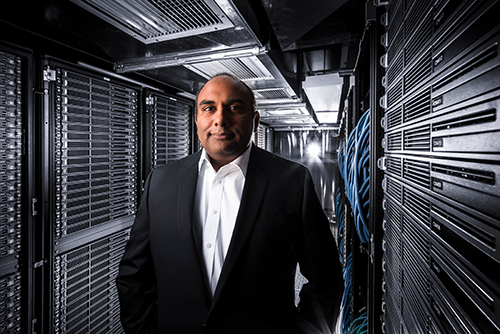
Director of the Performance Science Lab, Dr. Ranil Sonnadara.
The Performance Science Lab is directed by Dr. Ranil Sonnadara, and it studies the way that people learn new skills. The Performance Science Lab is particularly interested in how information flow across the motor and perceptual systems changes with practice, and how feedback and assessment can be effectively implemented to support skill acquisition. The lab also studies ways to optimize performance in high-stakes environments, and how performance can be measured in meaningful ways. In 2017, the Surgical Foundations boot camp implemented by the Performance Science Lab completed a follow up OSCE (objective structured clinical examination) in June. The OSCE data was extremely promising, suggesting that at one-year into training, individuals who completed a boot camp performed significantly better than those who received traditional training (no boot camp) on a variety of focal skills. The Performance Science Lab was also interested in exploring the role of competence committees in competency-based training programs at McMaster. In 2017, the lab began with a survey of key stakeholders across 13 specialties at McMaster in order to understand initial perceptions and experiences of implementing competence committees locally. This work set great foundation in developing guidelines that will help the competency-based training programs with competence committee implementation and decision-making processes.
By the Numbers
ARiEAL Researchers have been active in dissemination through publishing articles and giving presentations, and have also been successful in securing research funding in 2017.
Publications
Presentations
Grants
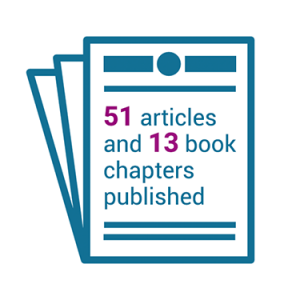
ARiEAL researchers published 51 articles and 13 book chapters in 2017. The research topics include but not limited to neuroimaging, word recognition, and applications in acquired brain injury and speech language pathology. Featured below are a selection of these articles.
Archibald, L.M.D. (2017). Working memory and language learning: A review. Child Language Teaching and Therapy, 33(1): 5-17.
Harrison, A.H., Noseworthy, M.D., Reilly, J.P., Guan, W., & Connolly, J.F. (2017). EEG and fMRI agree: Mental arithmetic is the easiest form of imagery to detect. Consciousness & Cognition, 48: 104-116.
Kwok, E.Y.L., Joanisse, M.F., Archibald, L.M.D., Stothers, M.E., Brown, H.M., & Oram Cardy, J. (2017). Maturation in auditory event-related potentials predicts language ability in children. European Journal of Neuroscience, 47(1): 69-76.
View full list of 2017 articles
View full list of 2017 book chapters
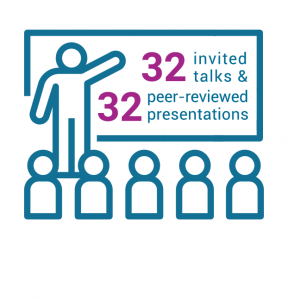
ARiEAL researchers presented 32 invited talks and 32 peer-reviewed conference presentations across continents in 2017. Featured below are a selection of these presentations.
Connolly, J. (2017, July). Neurolinguistics: Indispensable in the assessment of cognitive function in brain injury. Presented at the Linguistic Association of Canada and the United States Forum, Hamilton, Canada (Invited).
Kuperman, V. (2017, June). Survival analysis: A tool for timing semantic and formal effects on derived and compound word recognition. Presented at the Morphological Processing Conference, Trieste, Italy (Invited).
Kučerová, I. (2017, November). Phi-features at the syntax-semantics interface: Toward distributed semantics. Presented at the Biolinguistic Conference on Interface Asymmetries, New York, USA (Invited)
View full list of 2017 invited and peer-reviewed presentations
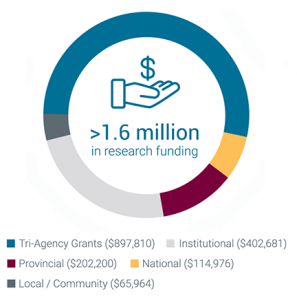 ARiEAL researchers started 23 research grants as Principal Investigator or Co-investigators in 2017. Funding totaled over 1.6 million dollars across these newly commenced projects.
ARiEAL researchers started 23 research grants as Principal Investigator or Co-investigators in 2017. Funding totaled over 1.6 million dollars across these newly commenced projects.
Funding sources include Canadian Institutes of Health Research (CIHR), Natural Sciences and Engineering Research Council (NSERC), Social Sciences and Humanities Research Council (SSHRC), Shared Hierarchical Academic Research Computing Network (SHARCNET) and various institutional and local organizations.
View full list of grants received in 2017 Anderson, C. (Principal Investigator). Essentials of Linguistics. eCampusOntario Open Textbook Initiative Grant: $15,000, 2017-2018. Cardy, J. (Principal Investigator) & Archibald, L. (Co-investigator). Clinical and Applied Research Excellence in Speech-Language Pathology. University of Western Ontario Institutional Grant: $5,000, 2017-2018. Cardy, J. (Principal Investigator) & Archibald, L. (Co-investigator). Establishing a Centre for Clinical and Applied Research Excellence in Speech Language Pathology at the University of Western Ontario. University of Western Ontario Institutional Grant: $50,000, 2017-2018. DeMatteo, C. (Principal Investigator). CanChild Pediatric Concussion Management Guidelines: Time to Update. CanChild Centre for Childhood Disability Research Institutional Grant: $10,000, 2017-2018. DeMatteo, C. (Principal Investigator), Trim, Z., Candlish, J., Macnamara, K., Young, G., King, M., Harris, T., Underhill, C., Nicholson, A., Rogano, A., Hucal, M., Madalena, J., Mancini, J., & Dudeck, D. (Co-investigators). Brain Smart Hamilton: “Let’s Play Safely!”. Hamilton Community Foundation Research Grant: $29,964, 2017-2018. DeMatteo, C. (Principal Investigator). mTBI Research. The Inglis Family Foundation Grant: 25,000, 2017-2021. DeMatteo, C. (Principal Investigator). mTBI Research. The Inglis Family Foundation Grant: $1,000. 2017-2018. DeMatteo, C. (Principal Investigator). mTBI Research. The Jack and Ina Pollock Foundation Grant: $5,000. 2017-2018. Galea, V. (Principal Investigator), Reilly, J. & Sonnadara, R.R. (Co-investigators). Quantitative Modelling of Spontaneous Movement in Infants: Development and Validation of a Machine-learning Approach. McMaster University Interdisciplinary Research Fund Grant: $20,000, 2017. Galea, V. & Reilly, J. (Co-principal Investigators). Quantitative Modeling of Spontaneous Movements in Infants. McMaster Faculty of Science Interdisciplinary Project Seed Fund Grant: $50,000, 2017. Joanisse, M.F. (Principal Investigator). Equipment Funding. NVidia Corporation Grant: $1,000, 2017-2018. Moulton, C. (Principal Investigator), McQueen, S.A., Mobilio, M.H., McGregor, C., & Sonnadara, R.R. (Co-investigators). The Shaky Scalpel: Investigating the Phenomenon of Stress in the Practice of Surgical Oncology. Princess Margaret Cancer Center Foundation Grant: $5,000, 2017. Noseworthy, M.D. (Principal Investigator). Advanced Magnetic Resonance Techniques for Rapid Non-invasive Monitoring of Neuromuscular Activity. Natural Sciences and Engineering Research Council of Canada (NSERC) Discovery Grant: $230,000, 2017-2021. Rafat, Y. (Principal Investigator) & Joanisse, M.F. (Co-investigator). Second Language Speech Production, Processing and Reading of Highly Proficient Bilinguals Living in Canada. Natural Sciences and Engineering Research Council of Canada (NSERC) Insight Development Grant: $67,286, 2017-2019. Reed, N. (Principal Investigator), Fuselli, P., DeMatteo, C., Ellis, M., Hung, R., Hunt, A., Hutchison, M., Kroshus-Havril, E., Markham, C., Provvidenza, C., Russell, K., Scratch, S., Tator, C., & Zemek, R. (Co-investigators). Concussion & You: A Peer-Led Approach to Raising Concussion Awareness in Canadian High Schools. Canadian Institute of Health Research (CIHR) Grant: $600,524, 2017-2021. Service, E. (Principal Investigator), Connelly, C., Černe, M., & Svedholm-Häkkinen, A.M. (Co-investigators). Costs and Benefits of Using a Non-Dominant Language in Simulated Work Tasks. McMaster University Arts Research Board Institutional Grant: $13,320, 2017-2018. Simunovic, M. (Principal Investigator), Meyers, B., Yemen, B., Forbes, S., Eskicioglu G., Tsai, S., Rebello, R., Wong, R., Fahim, T., & Sonnadara, R.R. (Co-investigators). Piloting and Evaluating the ‘Audit and Feedback, and, Reminders using Electronic Databases in Rectal Cancer’ (ARED-RC) Intervention in LHIN4. Hamilton Academic Health Sciences Organization Innovation Fund Grant: $174,220, 2017. Sonnadara, R.R. (Principal Investigator), Khedri, R., Pfaff, T., Godsmark, R., Badawy, G., & Ghosh, S. Development of the CanIDS Aggregation and Visualization Platform. CANARIE Joint Security Project Grant: $84,976, 2017. Sonnadara, R.R. (Principal Investigator), Britten, J. & Guan, W. (Co-investigators). Extending MAX3D. Shared Hierarchical Academic Research Computing Network (SHARCNET) Dedicated Programming Competition Round VIII Grant: $30,000, 2017. Sonnadara, R.R. & Amin, N. (Co-principal Investigators), Kelly, S. & Wagner, N. (Co-investigators). Promoting Simulation Training in Residency Education. McMaster Surgical Associates Education Research Grant: $29,942, 2017. Sonnadara, R.R. & Kelly, S. (Co-principal Investigators), Acai, A., Fahim, C., & Reid, D. (Co-investigators). Examining the Implementation and Functioning of Competence Committees in Surgical Training. McMaster Surgical Associates Education Research Grant: $20,884, 2017. Sonnadara, R.R. & Petrisor, B. (Co-principal Investigators), & Kalun, P. (Co-investigator). Development of a Comprehensive Assessment Framework in Orthopaedics. McMaster Surgical Associates Education Research Grant: $29,306, 2017. Frey, B.N. (Principal Investigator), Noseworthy, M.D., Mishra, R., Kapczinski, F., & Minuzzi, L. (Co-investigators). A Translational Study of Blood-brain Barrier Disruption in Bipolar Disorder: Implications for a New Pathway for Drug Development. Physician Services Incorporated (PSI) Foundation Research Grant: $187,200, 2017-2019.
Impact
ARiEAL aims to expanding the research reach beyond the traditional means and to engage the broader community. In 2017, we started showcasing our research excellence through our website, Twitter and open access repository. Various talks and workshops were hosted to provide opportunities for interdisciplinary, experiential, and problem-based learning for our trainees and community.
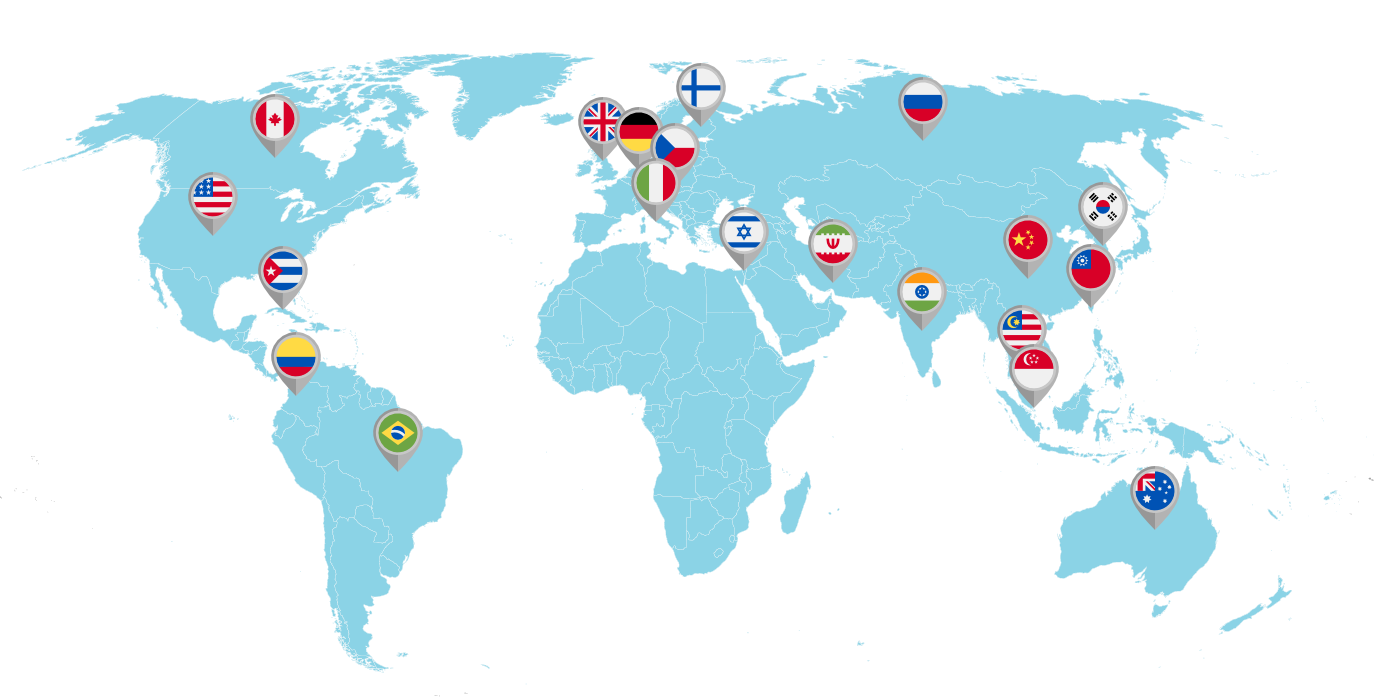
On February 1, 2017, ARiEAL officially launched its website as a platform to share our research knowledge with a broader community beyond borders. This map highlighted the TOP 20 countries where our website visitors come from. Our official Twitter account further facilitates the research community engagement. In 2017, we’ve reached a total of 34,046 impressions with 74 tweets and had over 1,000 engagement counts.
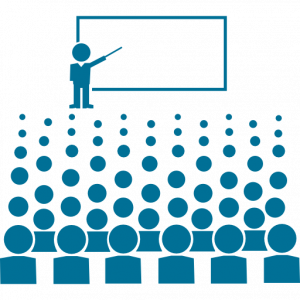 In 2017, ARiEAL co-hosted nine “Cognitive Science of Lecture Series” talks and one Career Workshop with the Department of Linguistics & Languages. We invited renowned researchers and experts from various parts across the world to share their expertise with us. Together, ARiEAL also co-hosted the 5th annual Montreal-Ottawa-Toronto-Hamilton Conference on Syntax (MOTH 5) with the Department of Linguistics & Languages. MOTH 5 is a venue for graduate students to present their ongoing work and to get feedback from faculty and fellow students.
In 2017, ARiEAL co-hosted nine “Cognitive Science of Lecture Series” talks and one Career Workshop with the Department of Linguistics & Languages. We invited renowned researchers and experts from various parts across the world to share their expertise with us. Together, ARiEAL also co-hosted the 5th annual Montreal-Ottawa-Toronto-Hamilton Conference on Syntax (MOTH 5) with the Department of Linguistics & Languages. MOTH 5 is a venue for graduate students to present their ongoing work and to get feedback from faculty and fellow students.
View full list of Lecture Series Talks and Conferences hosted in 2017 Cognitive Science of Language Lecture Series Talks Dr. Jessica Coon, Associate Professor, Department of Linguistics, McGill University: Montréal, Canada. The Linguistics of Arrival: Aliens, Fieldwork and Universal Grammar. January 25, 2017. Dr. Khalil Iskarou, Assistant Professor, Department of Linguistics, University of Southern California: Los Angeles, USA. Discreteness and Dynamics in Computation: From Octopus Behavior to Language. February 8, 2017. Dr. Lucie Ménard, Adjunct Professor, School of Communication Sciences and Disorders, McGill University: Montréal, Canada. Multisensory Speech Perception and Production. March 8, 2017. Dr. John Anderson, Postdoctoral Fellow, Department of Psychology, York University: Toronto, Canada. Imaging the Aging Bilingual Brain. March 22, 2017. Dr. Suzi Lima, Assistant Professor, Department of Spanish & Portuguese, University of Toronto: Toronto, Canada. The Role of Count Lists in the Acquisition of Numerals. April 5, 2017. Dr. Doug Whalen, Vice President of Research, Haskins Laboratories, Yale University: New Haven, USA. Characteristics and Usefulness of Phonetic Variability. October 18, 2017. Dr. Sascha Schroeder, Adjunct Researcher, Center for Lifespan Psychology, Max Planck Institute for Human Development: Berlin, Germany. Decomposing the Frequency by Skill Interaction. November 1, 2017. Dr. Elissa Asp, Professor, English Department and Linguistics Program, Saint Mary’s University: Halifax, Canada. Brain Imaging in Research on Language. November 15, 2017. Dr. Arsalan Kahnemuyipour, Associate Professor, Department of Language Studies, University of Toronto: Toronto, Canada. Nominal Linkers: The Case of Ezafe in Iranian Languages. November 29, 2017. McMaster University Department of Linguistics & Languages Career Workshop Dr. Anna Marie Trester, Creator of CareerLinguist.com. Bringing Linguistics to Work(shop). September 13, 2017. 5th Annual Montreal-Ottawa-Toronto-Hamilton Conference on Syntax (MOTH 5) Keynote Speakers: Dr. Brian Dillon, Associate Professor, Department of Linguistics, University of Massachusetts Amherst: Amherst, USA.
Dr. Susana Béjar, Assistant Professor, Department of Linguistics, University of Toronto: Toronto, Canada.
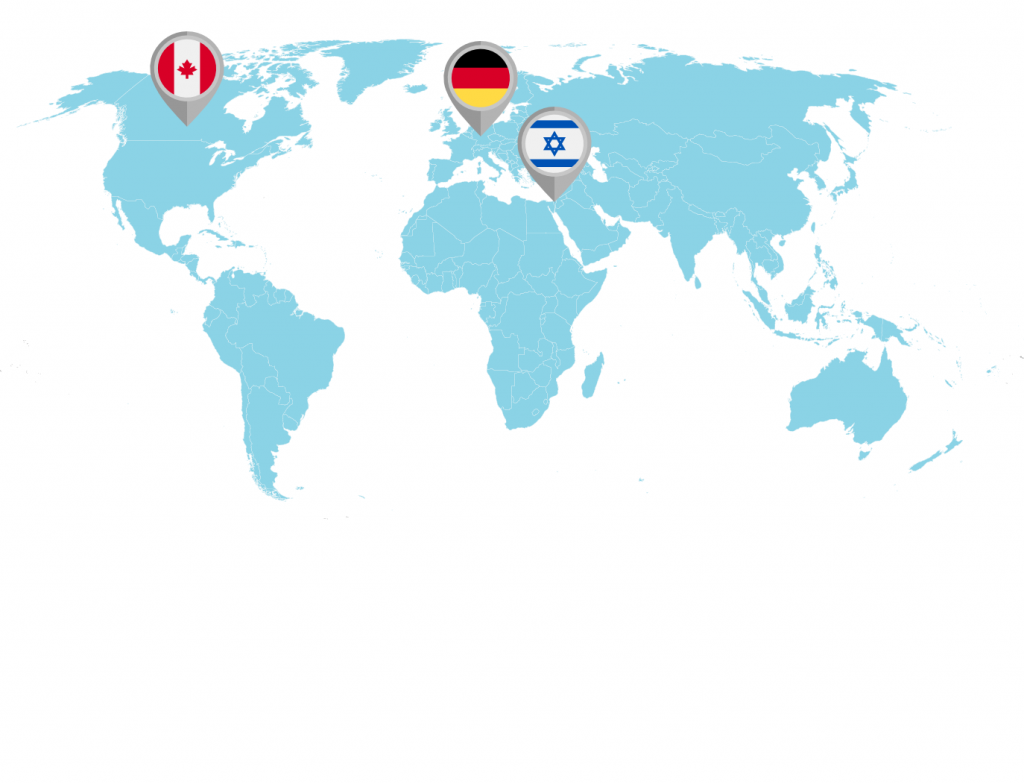
ARiEAL hosted three specialized workshops on statistical analyses and EEG pipeline in 2017 with experts from Montreal (Canada), Berlin (Germany), and Jerusalem (Israel):
Dr. Stefanie Blain-Moraes, Assistant Professor, School of Physical & Occupational Therapy, McGill University: Montréal, Canada. New EEG Pipeline. March 28, 2017.
Dr. Sascha Schroeder, Adjunct Researcher, Center for Lifespan Psychology, Max Planck Institute for Human Development: Berlin, Germany. Analyzing Interactions and Non-Linear Effects in Mixed-Effect Models. November 4, 2017.
Noam Siegelman, Department of Cognitive Sciences, The Hebrew University of Jerusalem: Jerusalem, Israel. Bayesian Statistics. November 22, 2017.
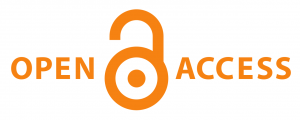 ARiEAL endeavours to support Open Access in research. In addition to publishing in Open Access journals, ARiEAL started archiving representative publications from our researchers at MacSphere (McMaster University’s Institutional Repository). This Open Access initiative commenced in 2017 and is continually progressing.
ARiEAL endeavours to support Open Access in research. In addition to publishing in Open Access journals, ARiEAL started archiving representative publications from our researchers at MacSphere (McMaster University’s Institutional Repository). This Open Access initiative commenced in 2017 and is continually progressing.The Centre
Founded in late 2016, the year of 2017 marked the first full calendar year since our inception. It is a collective effort that we are able to celebrate success achieved in 2017.
John Connolly (Department of Linguistics and Languages, McMaster University)
ASSOCIATE DIRECTOR
Anna Moro (Department of Linguistics and Languages, McMaster University)
FULL MEMBERS
Catherine Anderson (Department of Linguistics and Languages, McMaster University)
Marc Joanisse (Department of Psychology, University of Western Ontario)
Ivona Kučerová (Department of Linguistics and Languages, McMaster University)
Victor Kuperman (Department of Linguistics and Languages, McMaster University)
Michael Noseworthy (Department of Electrical and Computer Engineering, McMaster University)
Daniel Pape (Department of Linguistics and Languages, McMaster University)
Jim Reilly (Department of Electrical and Computer Engineering, McMaster University)
Elisabet Service (Department of Linguistics and Languages, McMaster University)
Lyn Turkstra (School of Rehabilitation Science, McMaster University)
ASSOCIATE MEMBERS
Lisa Archibald (Department of Psychology, University of Western Ontario)
Carol DeMatteo (School of Rehabilitation Science, McMaster University)
Paul Grunthal (McMaster Industry Liaison Office, McMaster University)
Patty Solomon (School of Rehabilitation Science, McMaster University)
Ranil Sonnadara (Department of Surgery, McMaster University)
COLLABORATOR
Tsee Leng Choy (Department of Psychology, HELP University, Kuala Lumpur, Malaysia)
Sinisa Colic (Co-supervised by Drs. Jim Reilly and Gary Hasey)
Kiret Dhindsa (Supervised by Dr. Ranil Sonnadara)
Michel Genereux (Supervised by Dr. Victor Kuperman)*
Amy Harrison (Supervised by Dr. Michael Noseworthy)*
Aki-Juhani Kyröläinen (Supervised by Dr. Victor Kuperman)
Daniel Schmidtke (Supervised by Dr. Anna Moro)
Nicholas Welch (Supervised by Dr. Ivona Kučerová)
PHD STUDENTS
Anita Acai (Supervised by Dr. Ranil Sonnadara)
Narges Armanfard (Co-supervised by Drs. John Connolly and Jim Reilly)*
Rober Boshra (Co-supervised by Drs. John Connolly and Jim Reilly)
Cassandra Chapman (Supervised by Dr. Ivona Kučerová)
Phil Chrapka (Supervised by Dr. Jim Reilly)*
Melda Coskun (Supervised by Dr. Victor Kuperman)
Alexandra Cross (Co-supervised by Drs. Lisa Archibald and Marc Joanisse)
Tina Fahim (Supervised by Dr. Ranil Sonnadara)
Adianes Herrera (Supervised by Dr. John Connolly)
Constance Imbault (Supervised by Dr. Victor Kuperman)
Alyssa Kuciak (Supervised by Dr. Lisa Archibald)
Richard Mah (Supervised by Dr. John Connolly)
Sydney McQueen (Supervised by Dr. Ranil Sonnadara)
Emily Nichols (Supervised by Dr. Marc Joanisse)
Kelly Nisbet (Supervised by Dr. Victor Kuperman)
Nicolette Noonan (Co-supervised by Drs. Lisa Archibald and Marc Joanisse)
Anni Nora (Supervised by Dr. Elisabet Service)*
Gaisha Oralova (Supervised by Dr. John Connolly)
Laura Pauls (Supervised by Dr. Lisa Archibald)
Theresa Pham (Supervised by Dr. Lisa Archibald)
Paul Polak (Supervised by Dr. Michael Noseworthy)
Adam Politis (Supervised by Dr. Lyn Turkstra)
Fareeha Rana (Co-supervised by Drs. John Connolly and Elisabet Service)
Alex Rokos (Co-supervised by Drs. John Connolly and Stefanie Blain-Moraes)
Kyle Ruiter (Supervised by Dr. John Connolly)
Alejandro Santos Diaz (Supervised by Dr. Michael Noseworthy)
Edalat Shekari (Supervised by Dr. Elisabet Service)
Bryor Snefjella (Supervised by Dr. Victor Kuperman)
Narcisse Torshizi (Supervised by Dr. Elisabet Service)
Karen Tucker (Supervised by Dr. John Connolly)
Meghan Vollebregt (Supervised by Dr. Lisa Archibald)
Natalie Wagner (Supervised by Dr. Ranil Sonnadara)
Chelsea Whitwell (Supervised by Dr. Elisabet Service)
Joseph Wzaley (Supervised by Dr. Lyn Turkstra)
MASTER STUDENTS
Fateme Armanfard (Co-supervised by Drs. John Connolly and Jim Reilly)
Erin Cole (Supervised by Prof. Carol DeMatteo)
Davide Gentile (Supervised by Dr. Victor Kuperman)
Michael Greencorn (Supervised by Dr. Elisabet Service)*
Diana Harasym (Supervised by Dr. Michael Noseworthy)
Sara Jamil (Supervised by Dr. Ranil Sonnadara)
Richard Kolesar (Supervised by Dr. John Connolly)
Natalia Lapinskaya (Supervised by Dr. John Connolly)
Kenny San-Hei Luk (Co-supervised by Drs. Daniel Pape and Elisabet Service)*
Colm McCarthy (Supervised by Dr. Ranil Sonnadara)
Olivier Mercier (Supervised by Dr. Daniel Pape)
Omar Nassif (Co-supervised by Drs. Jim Reilly and Vickie Galea)
Joel Nidel (Supervised by Dr. Marc Joanisse)
Frederico Prado (Supervised by Dr. Ivona Kučerová)
Natalie Romaniuk (Supervised by Prof. Carol DeMatteo)
Nicolas Simard (Supervised by Dr. Michael Noseworthy)
Chris Steyn (Supervised by Dr. Ranil Sonnadara)
Laura VanderBeek (Supervised by Dr. Ranil Sonnadara)
*Completed program in 2017
Chia-Yu Lin
STUDENT ASSISTANTS
Joyce Le (January – April, 2017)
Nagashree Thovinakere (January – August, 2017)
Angie Lopez (September – December, 2017)
- Dr. Sylvain Baillet (McGill University)
- Dr. Laurie Feldman (University at Albany)
- Dr. Denise Klein (McGill University)
- Dr. Ken McRae (University of Western Ontario)
- Dr. Lucie Ménard (Université du Québec à Montréal; UQAM)
- Dr. Penny Pexman (University of Calgary)
- Dr. Ken Pugh (Haskins Laboratories)
- Dr. Sid Segalowitz (Brock University)
- Dr. Jon Sprouse (University of Connecticut)
- Haskins Laboratories, New Haven, Connecticut, USA
- University of Turku (Department of Psychology and Speech-Language Pathology), Turku, Finland.
- Words in the World (WoW), Partnership Grant funded by the Social Sciences and Humanities Research Council of Canada (SSHRC), Canada
Produced & Designed by Brie Chauncey, Chia-Yu Lin, Kiera DiLeonardo and Brittany Gottvald. Many thanks to all ARiEAL members and trainees for their contribution to this report.
L.R. Wilson Hall, room 4020
McMaster University
1280 Main St. West
Hamilton, Ontario L8S 4K1, Canada

ARiEAL Research Centre
L.R. Wilson Hall, room 4020
McMaster University
1280 Main St. West
Hamilton, Ontario L8S 4K1, Canada
Phone: 905-525-9140 x21032
Email: ariealrc@mcmaster.ca
Twitter: @arieal_research

